Research on proposal for implementing probationary leaders and managers model at Vietnam Academy for ethnic minorities
On the basis of the conception of the probationary leaders and managers; the guiding docu ments of the Vietnamese Communist Party and the Government on the probationary leadersand managers; current status and problems arising from the probationary leaders and managers,
the author analyzes and interprets the current structure, organization and current status of the devision-level cadres and civil servants and the department-level cadres of the Vietnam Academy for
Ethnic Minorities, from which the solution for implementing the probationary leaders and managers
model is proposed, which is one of the reasons for choosing the best cadres and civil servants, contributing to the improved legal documents system in this regard.
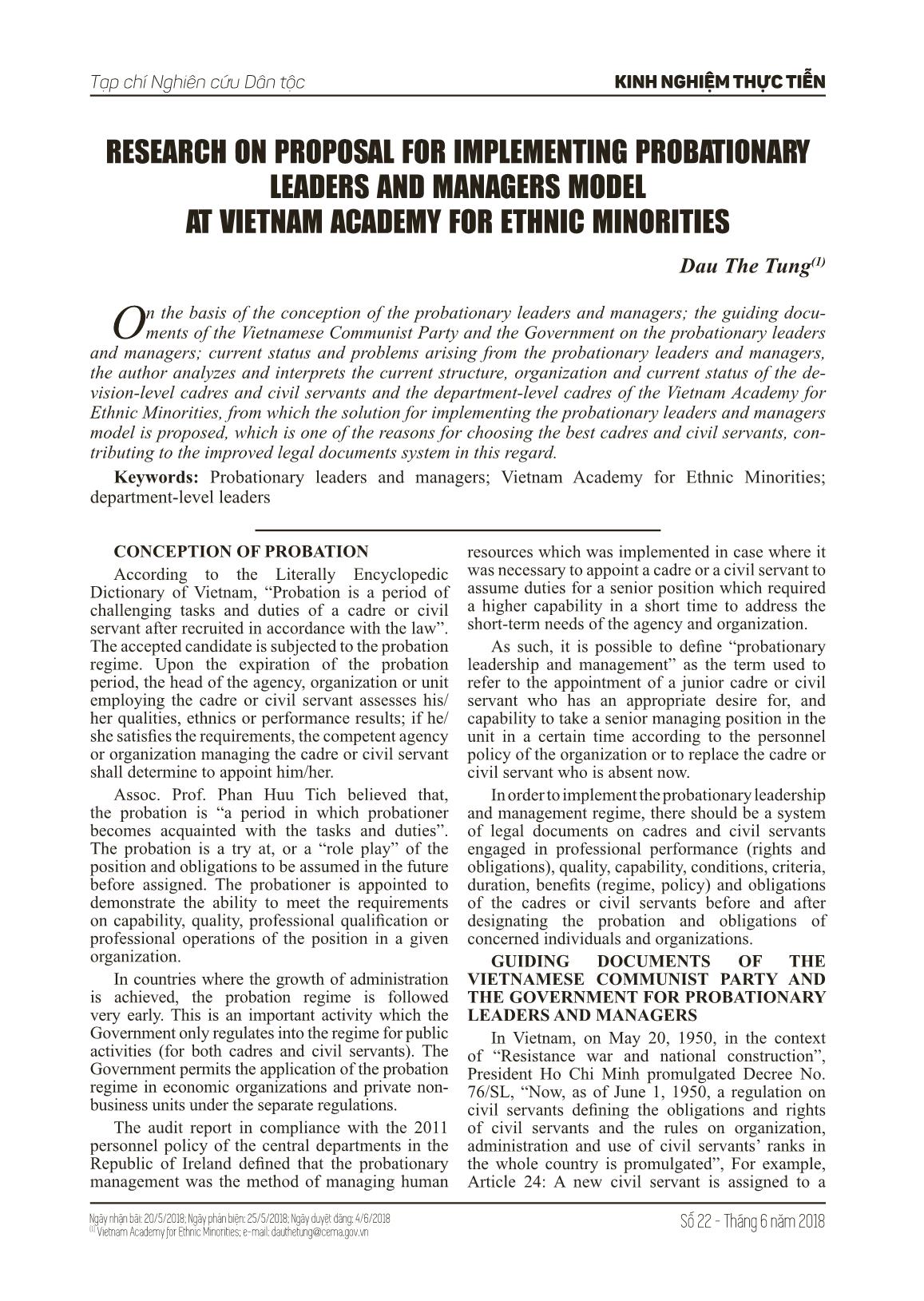
Trang 1
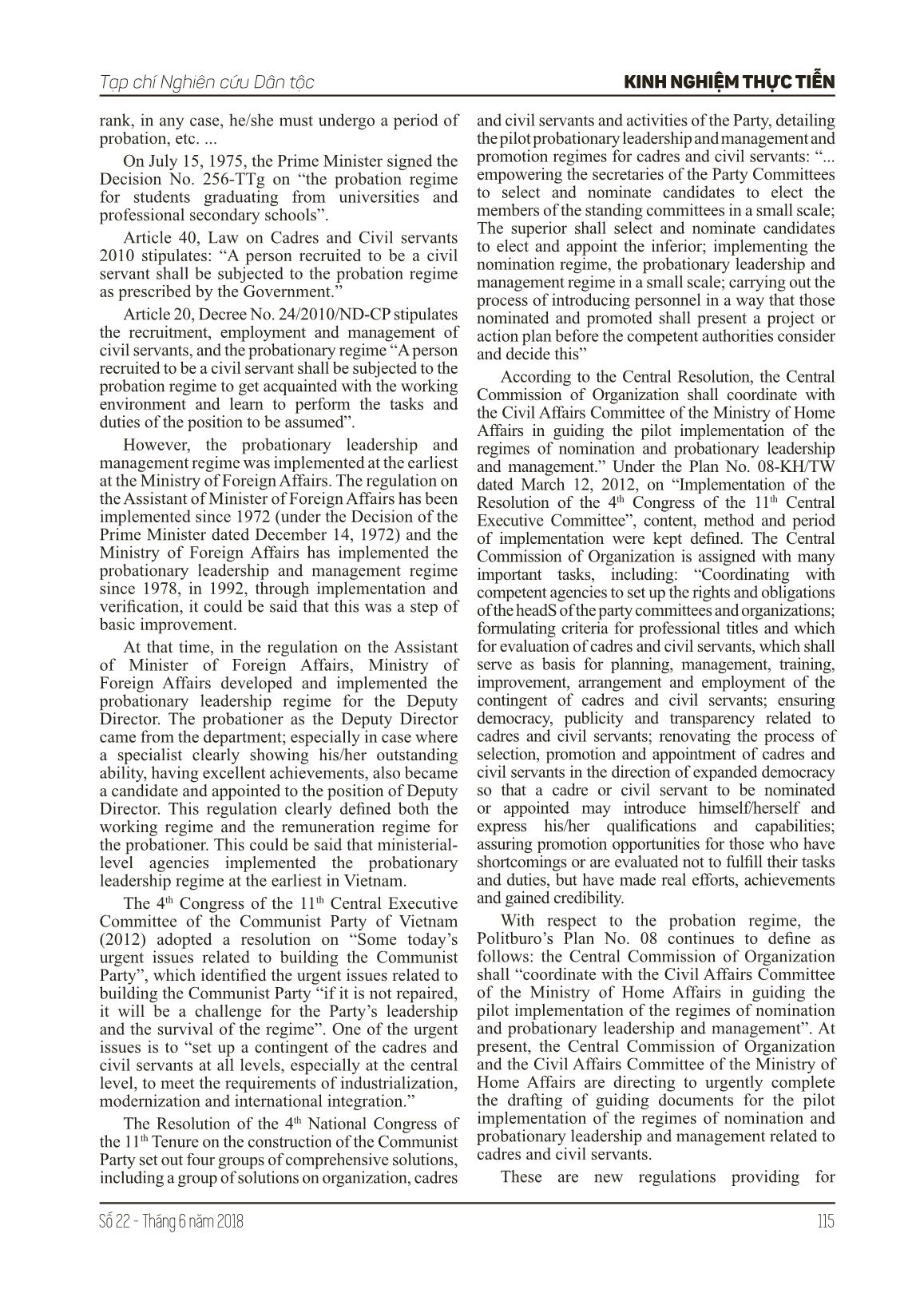
Trang 2
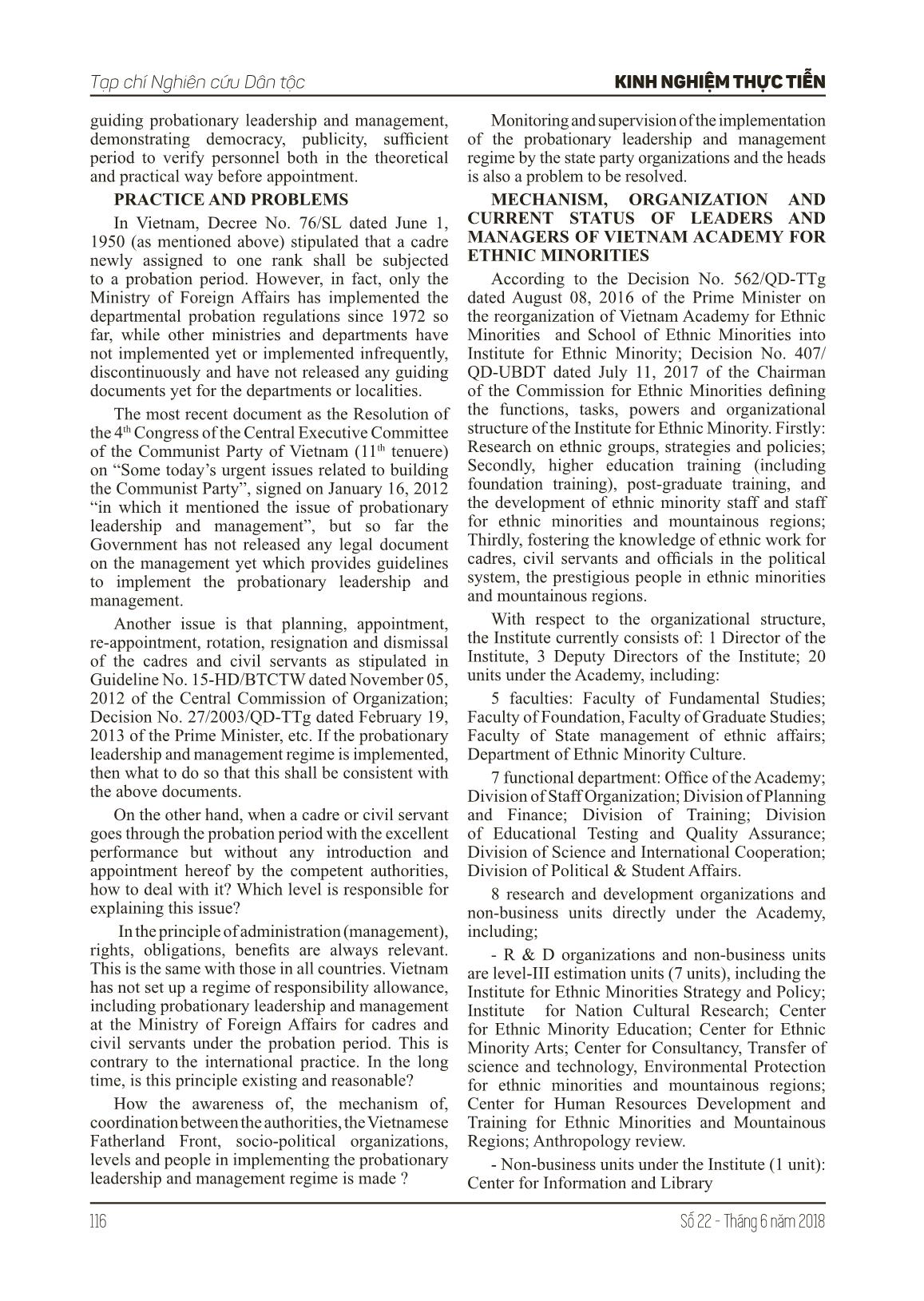
Trang 3
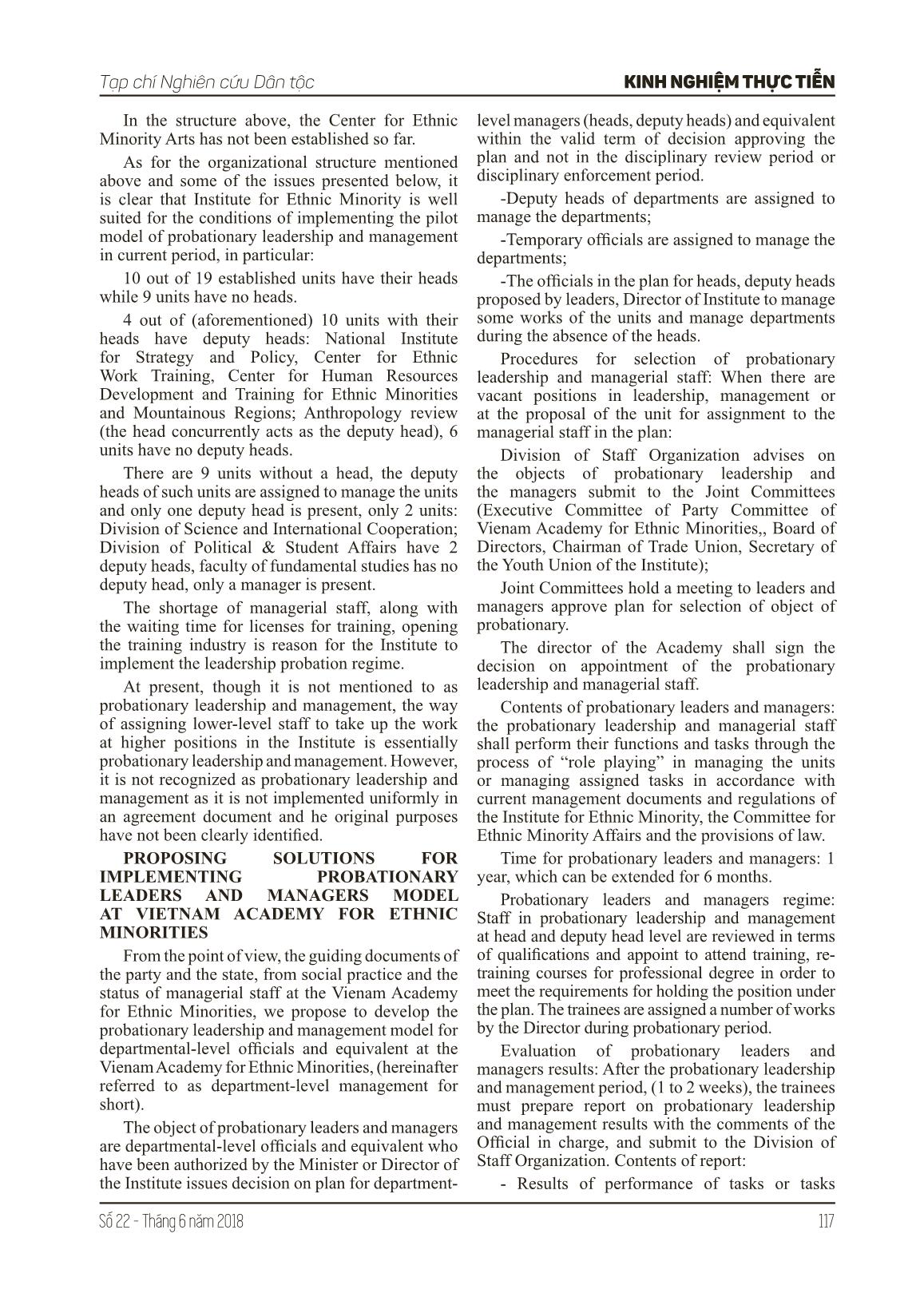
Trang 4
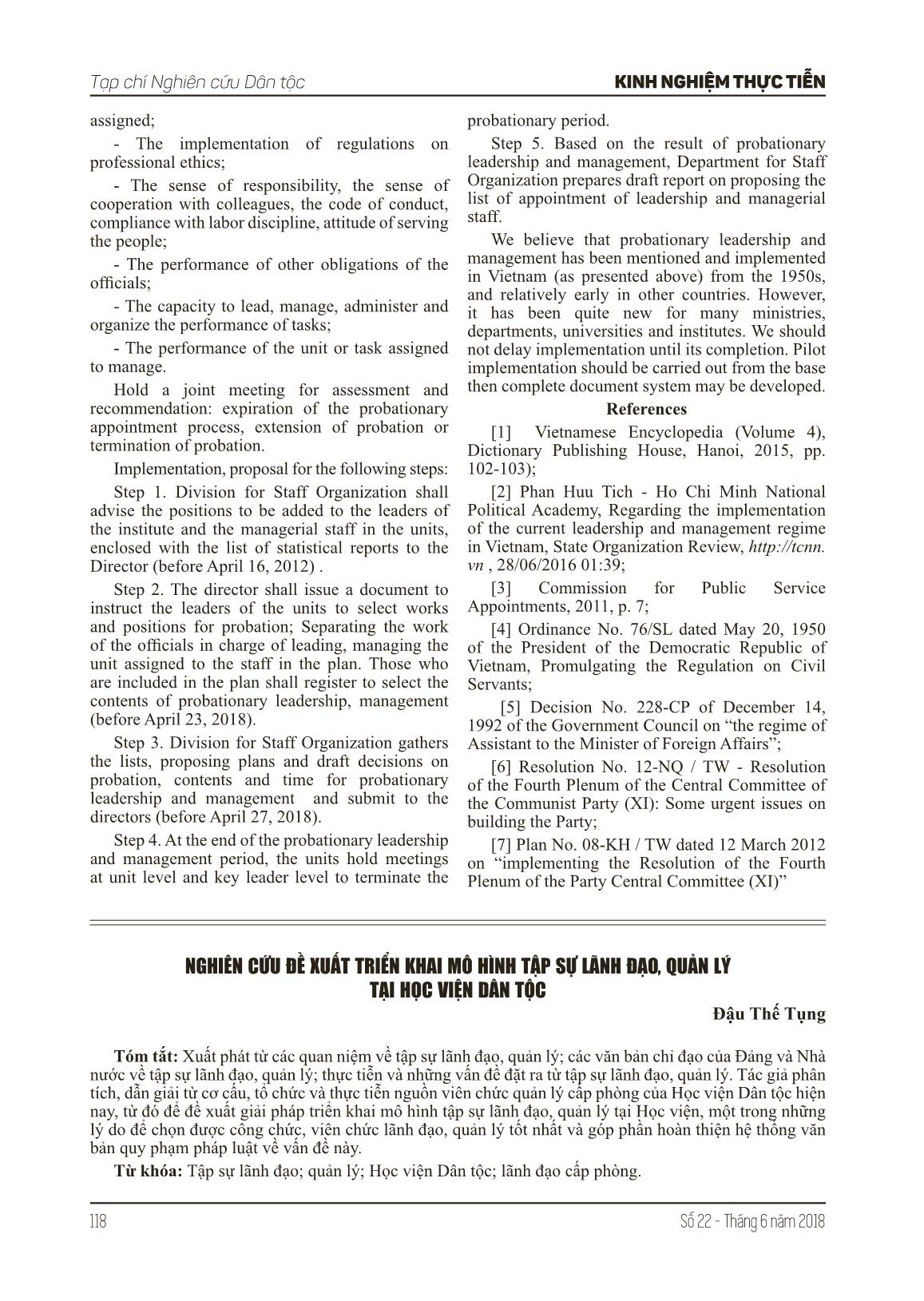
Trang 5
Tóm tắt nội dung tài liệu: Research on proposal for implementing probationary leaders and managers model at Vietnam Academy for ethnic minorities
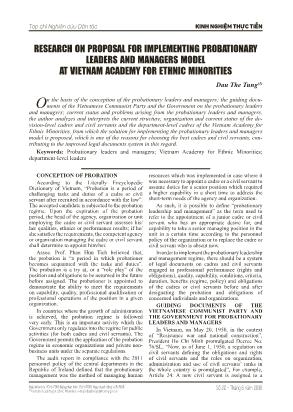
ry leadership and management related to cadres and civil servants. These are new regulations providing for Tạp chí Nghiên cứu Dân tộc KINH NGHIỆM THỰC TIỄN 116 Số 22 - Tháng 6 năm 2018 guiding probationary leadership and management, demonstrating democracy, publicity, sufficient period to verify personnel both in the theoretical and practical way before appointment. PRACTICE AND PROBLEMS In Vietnam, Decree No. 76/SL dated June 1, 1950 (as mentioned above) stipulated that a cadre newly assigned to one rank shall be subjected to a probation period. However, in fact, only the Ministry of Foreign Affairs has implemented the departmental probation regulations since 1972 so far, while other ministries and departments have not implemented yet or implemented infrequently, discontinuously and have not released any guiding documents yet for the departments or localities. The most recent document as the Resolution of the 4th Congress of the Central Executive Committee of the Communist Party of Vietnam (11th tenuere) on “Some today’s urgent issues related to building the Communist Party”, signed on January 16, 2012 “in which it mentioned the issue of probationary leadership and management”, but so far the Government has not released any legal document on the management yet which provides guidelines to implement the probationary leadership and management. Another issue is that planning, appointment, re-appointment, rotation, resignation and dismissal of the cadres and civil servants as stipulated in Guideline No. 15-HD/BTCTW dated November 05, 2012 of the Central Commission of Organization; Decision No. 27/2003/QD-TTg dated February 19, 2013 of the Prime Minister, etc. If the probationary leadership and management regime is implemented, then what to do so that this shall be consistent with the above documents. On the other hand, when a cadre or civil servant goes through the probation period with the excellent performance but without any introduction and appointment hereof by the competent authorities, how to deal with it? Which level is responsible for explaining this issue? In the principle of administration (management), rights, obligations, benefits are always relevant. This is the same with those in all countries. Vietnam has not set up a regime of responsibility allowance, including probationary leadership and management at the Ministry of Foreign Affairs for cadres and civil servants under the probation period. This is contrary to the international practice. In the long time, is this principle existing and reasonable? How the awareness of, the mechanism of, coordination between the authorities, the Vietnamese Fatherland Front, socio-political organizations, levels and people in implementing the probationary leadership and management regime is made ? Monitoring and supervision of the implementation of the probationary leadership and management regime by the state party organizations and the heads is also a problem to be resolved. MECHANISM, ORGANIZATION AND CURRENT STATUS OF LEADERS AND MANAGERS OF VIETNAM ACADEMY FOR ETHNIC MINORITIES According to the Decision No. 562/QD-TTg dated August 08, 2016 of the Prime Minister on the reorganization of Vietnam Academy for Ethnic Minorities and School of Ethnic Minorities into Institute for Ethnic Minority; Decision No. 407/ QD-UBDT dated July 11, 2017 of the Chairman of the Commission for Ethnic Minorities defining the functions, tasks, powers and organizational structure of the Institute for Ethnic Minority. Firstly: Research on ethnic groups, strategies and policies; Secondly, higher education training (including foundation training), post-graduate training, and the development of ethnic minority staff and staff for ethnic minorities and mountainous regions; Thirdly, fostering the knowledge of ethnic work for cadres, civil servants and officials in the political system, the prestigious people in ethnic minorities and mountainous regions. With respect to the organizational structure, the Institute currently consists of: 1 Director of the Institute, 3 Deputy Directors of the Institute; 20 units under the Academy, including: 5 faculties: Faculty of Fundamental Studies; Faculty of Foundation, Faculty of Graduate Studies; Faculty of State management of ethnic affairs; Department of Ethnic Minority Culture. 7 functional department: Office of the Academy; Division of Staff Organization; Division of Planning and Finance; Division of Training; Division of Educational Testing and Quality Assurance; Division of Science and International Cooperation; Division of Political & Student Affairs. 8 research and development organizations and non-business units directly under the Academy, including; - R & D organizations and non-business units are level-III estimation units (7 units), including the Institute for Ethnic Minorities Strategy and Policy; Institute for Nation Cultural Research; Center for Ethnic Minority Education; Center for Ethnic Minority Arts; Center for Consultancy, Transfer of science and technology, Environmental Protection for ethnic minorities and mountainous regions; Center for Human Resources Development and Training for Ethnic Minorities and Mountainous Regions; Anthropology review. - Non-business units under the Institute (1 unit): Center for Information and Library Tạp chí Nghiên cứu Dân tộc KINH NGHIỆM THỰC TIỄN 117Số 22 - Tháng 6 năm 2018 In the structure above, the Center for Ethnic Minority Arts has not been established so far. As for the organizational structure mentioned above and some of the issues presented below, it is clear that Institute for Ethnic Minority is well suited for the conditions of implementing the pilot model of probationary leadership and management in current period, in particular: 10 out of 19 established units have their heads while 9 units have no heads. 4 out of (aforementioned) 10 units with their heads have deputy heads: National Institute for Strategy and Policy, Center for Ethnic Work Training, Center for Human Resources Development and Training for Ethnic Minorities and Mountainous Regions; Anthropology review (the head concurrently acts as the deputy head), 6 units have no deputy heads. There are 9 units without a head, the deputy heads of such units are assigned to manage the units and only one deputy head is present, only 2 units: Division of Science and International Cooperation; Division of Political & Student Affairs have 2 deputy heads, faculty of fundamental studies has no deputy head, only a manager is present. The shortage of managerial staff, along with the waiting time for licenses for training, opening the training industry is reason for the Institute to implement the leadership probation regime. At present, though it is not mentioned to as probationary leadership and management, the way of assigning lower-level staff to take up the work at higher positions in the Institute is essentially probationary leadership and management. However, it is not recognized as probationary leadership and management as it is not implemented uniformly in an agreement document and he original purposes have not been clearly identified. PROPOSING SOLUTIONS FOR IMPLEMENTING PROBATIONARY LEADERS AND MANAGERS MODEL AT VIETNAM ACADEMY FOR ETHNIC MINORITIES From the point of view, the guiding documents of the party and the state, from social practice and the status of managerial staff at the Vienam Academy for Ethnic Minorities, we propose to develop the probationary leadership and management model for departmental-level officials and equivalent at the Vienam Academy for Ethnic Minorities, (hereinafter referred to as department-level management for short). The object of probationary leaders and managers are departmental-level officials and equivalent who have been authorized by the Minister or Director of the Institute issues decision on plan for department- level managers (heads, deputy heads) and equivalent within the valid term of decision approving the plan and not in the disciplinary review period or disciplinary enforcement period. -Deputy heads of departments are assigned to manage the departments; -Temporary officials are assigned to manage the departments; -The officials in the plan for heads, deputy heads proposed by leaders, Director of Institute to manage some works of the units and manage departments during the absence of the heads. Procedures for selection of probationary leadership and managerial staff: When there are vacant positions in leadership, management or at the proposal of the unit for assignment to the managerial staff in the plan: Division of Staff Organization advises on the objects of probationary leadership and the managers submit to the Joint Committees (Executive Committee of Party Committee of Vienam Academy for Ethnic Minorities,, Board of Directors, Chairman of Trade Union, Secretary of the Youth Union of the Institute); Joint Committees hold a meeting to leaders and managers approve plan for selection of object of probationary. The director of the Academy shall sign the decision on appointment of the probationary leadership and managerial staff. Contents of probationary leaders and managers: the probationary leadership and managerial staff shall perform their functions and tasks through the process of “role playing” in managing the units or managing assigned tasks in accordance with current management documents and regulations of the Institute for Ethnic Minority, the Committee for Ethnic Minority Affairs and the provisions of law. Time for probationary leaders and managers: 1 year, which can be extended for 6 months. Probationary leaders and managers regime: Staff in probationary leadership and management at head and deputy head level are reviewed in terms of qualifications and appoint to attend training, re- training courses for professional degree in order to meet the requirements for holding the position under the plan. The trainees are assigned a number of works by the Director during probationary period. Evaluation of probationary leaders and managers results: After the probationary leadership and management period, (1 to 2 weeks), the trainees must prepare report on probationary leadership and management results with the comments of the Official in charge, and submit to the Division of Staff Organization. Contents of report: - Results of performance of tasks or tasks Tạp chí Nghiên cứu Dân tộc KINH NGHIỆM THỰC TIỄN 118 Số 22 - Tháng 6 năm 2018 assigned; - The implementation of regulations on professional ethics; - The sense of responsibility, the sense of cooperation with colleagues, the code of conduct, compliance with labor discipline, attitude of serving the people; - The performance of other obligations of the officials; - The capacity to lead, manage, administer and organize the performance of tasks; - The performance of the unit or task assigned to manage. Hold a joint meeting for assessment and recommendation: expiration of the probationary appointment process, extension of probation or termination of probation. Implementation, proposal for the following steps: Step 1. Division for Staff Organization shall advise the positions to be added to the leaders of the institute and the managerial staff in the units, enclosed with the list of statistical reports to the Director (before April 16, 2012) . Step 2. The director shall issue a document to instruct the leaders of the units to select works and positions for probation; Separating the work of the officials in charge of leading, managing the unit assigned to the staff in the plan. Those who are included in the plan shall register to select the contents of probationary leadership, management (before April 23, 2018). Step 3. Division for Staff Organization gathers the lists, proposing plans and draft decisions on probation, contents and time for probationary leadership and management and submit to the directors (before April 27, 2018). Step 4. At the end of the probationary leadership and management period, the units hold meetings at unit level and key leader level to terminate the probationary period. Step 5. Based on the result of probationary leadership and management, Department for Staff Organization prepares draft report on proposing the list of appointment of leadership and managerial staff. We believe that probationary leadership and management has been mentioned and implemented in Vietnam (as presented above) from the 1950s, and relatively early in other countries. However, it has been quite new for many ministries, departments, universities and institutes. We should not delay implementation until its completion. Pilot implementation should be carried out from the base then complete document system may be developed. References [1] Vietnamese Encyclopedia (Volume 4), Dictionary Publishing House, Hanoi, 2015, pp. 102-103); [2] Phan Huu Tich - Ho Chi Minh National Political Academy, Regarding the implementation of the current leadership and management regime in Vietnam, State Organization Review, vn , 28/06/2016 01:39; [3] Commission for Public Service Appointments, 2011, p. 7; [4] Ordinance No. 76/SL dated May 20, 1950 of the President of the Democratic Republic of Vietnam, Promulgating the Regulation on Civil Servants; [5] Decision No. 228-CP of December 14, 1992 of the Government Council on “the regime of Assistant to the Minister of Foreign Affairs”; [6] Resolution No. 12-NQ / TW - Resolution of the Fourth Plenum of the Central Committee of the Communist Party (XI): Some urgent issues on building the Party; [7] Plan No. 08-KH / TW dated 12 March 2012 on “implementing the Resolution of the Fourth Plenum of the Party Central Committee (XI)” NGHIÊN CỨU ĐỀ XUẤT TRIỂN KHAI MÔ HÌNH TẬP SỰ LÃNH ĐẠO, QUẢN LÝ TẠI HỌC VIỆN DÂN TỘC Đậu Thế Tụng Tóm tắt: Xuất phát từ các quan niệm về tập sự lãnh đạo, quản lý; các văn bản chỉ đạo của Đảng và Nhà nước về tập sự lãnh đạo, quản lý; thực tiễn và những vấn đề đặt ra từ tập sự lãnh đạo, quản lý. Tác giả phân tích, dẫn giải từ cơ cấu, tổ chức và thực tiễn nguồn viên chức quản lý cấp phòng của Học viện Dân tộc hiện nay, từ đó để đề xuất giải pháp triển khai mô hình tập sự lãnh đạo, quản lý tại Học viện, một trong những lý do để chọn được công chức, viên chức lãnh đạo, quản lý tốt nhất và góp phần hoàn thiện hệ thống văn bản quy phạm pháp luật về vấn đề này. Từ khóa: Tập sự lãnh đạo; quản lý; Học viện Dân tộc; lãnh đạo cấp phòng.
File đính kèm:
 research_on_proposal_for_implementing_probationary_leaders_a.pdf
research_on_proposal_for_implementing_probationary_leaders_a.pdf

